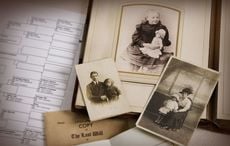Some stories cling to us forever. I’m not certain why that is.
In 1936 my mother’s sixteen-year old neighbor was sentenced to die in the electric chair for a murder he’d committed. I’ve thought about that story often in my life, but the details were always sketchy. I began researching the events and found connections to two seemingly unrelated stories that have intrigued me for years—the kidnapping of Charles A. Lindbergh’s son and my grandfather’s troubled youth. How are these events connected? Here’s my story:
Charles A. Lindbergh became a worldwide hero when he completed the first non-stop solo flight across the Atlantic in May of 1927. But the lives of Charles and his wife Ann were shattered on March 1, 1932 when their twenty-month-old son was snatched from the second floor nursery of their Hopewell, New Jersey home. On May 12 the baby’s partially decomposed body was discovered. Two years later, German born Bruno Richard Hauptmann was arrested and indicted for what had become the decade’s most notorious crime.
Hauptmann was brought to trial in 1935. Edward J. Reilly, a hard drinking, flamboyant lawyer from Brooklyn represented Hauptmann. Many feel that Reilly’s shoddy defense and bizarre behavior played a large part in Hauptmann’s conviction, sentencing and subsequent execution on April 3, 1936.
Six weeks before Hauptmann’s execution, in Brooklyn, NY, on the evening of February 20, Herman Meyerson’s wife and daughter said good night to him and walked upstairs to their apartment above Meyerson’s haberdashery. Fifteen minutes later sixteen-year-old Jimmy Sullivan entered the store, intent on robbery. Things didn’t go as planned; Meyerson put up a fight. Jimmy hit the man three times with a bowling pin, which he had shaved down to a small club. Meyerson died three days later.
On April 18 Jimmy was arrested and charged with murder. His family hired an attorney—the same attorney who unsuccessfully defended Bruno Richard Hauptmann—Edward J. Reilly
“Hurry, Dad, they’re taking Jimmy away,” my mother, Dorothy Gorman Hale, said, recalling the moment. My mother’s family, the Gormans, lived at 17 Folsom Place directly across the street from the Sullivan’s. “My father always told us if there were any problems to get him right away,” she said. “I was seven years old but I can still visualize the police walking up to the Sullivan’s door and returning to the street with Jimmy in handcuffs."
My grandfather, Allie Gorman, came running but he too could only watch as the police sped away with Jimmy.
”We couldn’t imagine what happened,” my mother said.
“When we learned Jimmy had been arrested for murder it took a while for it to sink in,” my mother said. “Your next-door neighbor wasn’t hustled off in handcuffs in real life. It was something you saw in a Jimmy Cagney movie. We were so shaken.”
James J. Sullivan was the oldest of the Sullivan’s eight children and was nicknamed “Little Dillinger” because of his fascination with Public Enemy Number One, John Dillinger. When the police came to question Jimmy he at first denied involvement, but the police told Jimmy they had his fingerprints on the murder weapon. (They didn’t.) Jimmy admitted the crime and told police he needed some extra pocket money to attend a party. The robbery had netted Jimmy nine dollars.
On November 13 Jimmy was found guilty of first-degree murder, which carried with it a mandatory sentence of death in the electric chair. Outside the courtroom young Jimmy said, "What the hell, they couldn't do anything else. I did the job." On November 24 Jimmy, now seventeen, boarded a train in New York City’s Grand Central Station on his way to Ossining, NY to await his execution at Sing Sing.
Meanwhile, Jimmy’s attorney, Edward J. Reilly, who had won many murder acquittals in Brooklyn and was featured in an issue of the New Yorker magazine, had his own problems: Reilly’s first wife had sued him for unpaid alimony; he was a heavy drinker, and it was rumored he suffered from syphilis. And then this: Two months after Jimmy’s conviction Reilly was committed to a psychiatric ward, suffering from depression. Considering his problems and his incompetence in the Hauptmann trial, I wonder, how competent was Jimmy Sullivan’s representation?
While Jimmy was on death row, reporters met with his parents. "Jimmy isn't a bad boy,' his mother, Rose, said of her first born. “Yet, he didn't want to go to school…” Tears came to her eyes. “We let him go out evenings,” she said. “We thought it was alright. And that was what happened. Sometimes I wonder."
In early 1937 Jimmy was able to escape the electric chair and was given a new trial based on procedural errors during the initial trial. This time he was convicted of second degree murder, but once again received a harsh sentence—seventy years in prison with a minimum of fifty.
The following year, Jimmy’s mother, Rose, aged 43, died. Nineteen-year old Jimmy, escorted by guards, returned to see his mother for the last time. My mother, Dorothy, then nine years old, was at the Sullivan’s home when Jimmy arrived. “It was the saddest thing I’d ever seen in my life,” my mother said. “The memory stayed with me for months.”
During his years in prison Jimmy delved into law journals and texts. In 1958, his assiduous study of the law paid off. He discovered an error made at retrial; drafted a formal petition for a writ of habeas corpus, and asked that he be freed immediately. Jimmy was granted a hearing and his sentence was reduced to a minimum of twenty years, which he’d already served. On the precondition that he had a job upon release, Jimmy would become a free man. My grandfather Allie Gorman, who had become a union representative with the Teamsters, arranged work for Jimmy. On February 29, 1959, James Joseph Sullivan walked out of Sing Sing.
I was young boy when my grandmother Florence Gorman died in 1963. The day after her death I was sitting in the funeral home when a thin, graying man in his mid-forties walked over to my grandfather and shook his hand. Soon he was kneeling in front of my grandmother. He blessed himself, rose from the casket and returned to my grandfather. They chatted for a few moments and then the man took a seat in the back of the room. The man was Jimmy Sullivan. Based on the stories I’d heard, I had an image of Jimmy as a wisecracking teenager brimming with bravado. But there were no signs of bravado in the man I’d seen praying at my grandmother’s casket.
A few years ago I learned that my grandfather regularly visited Jimmy at Sing Sing. He was very kind to Jimmy,” my mother said, “but I’ve always thought there were additional motives. Your grandfather had an awful childhood. His mother died when he was four and he was terribly scarred in a horrific fire that killed his brother. Six of his siblings died before the age of eight and his father was alcoholic and abusive. When it came to children and people in need your grandfather could never say no.” My mother added, “I also think his trips to the prison were reminders to his children that one slip-up, one moment of bad judgment, could change your life forever.”
I grew up hearing stories about my grandfather spending time at the Protectory, an orphanage in the Bronx, NY. Not long ago I found my grandfather’s Protectory enrollment card. Finally, I learned the truth. At the age of fifteen my grandfather was sent to the Catholic Protectory, which was not only an orphanage but a reform school as well. My grandfather had assaulted a man in the progress of a robbery. He had been arrested once prior to that for stealing tools, but it was never proven. I look at Jimmy’s prior criminal history, which is noted on his Sing Sing admissions’ record, and note that he too had juvenile issues prior to the events of 1936. My grandfather’s motivations seem clear now. I’m certain he must have felt, “There but for the grace of God go I.”
But I’m left to wonder: Would Jimmy have had a different fate if he’d had better representation? Was Edward J. Reilly able to competently represent Jimmy two months before being committed to a psychiatric ward? Might Jimmy’s sentence have been different? Might he have gotten out earlier and had children and grandchildren as my grandfather did?
And unlike Jimmy, what if my grandfather had hit the watchman harder? What if he’d killed him? Would I be here?
---
Charles R. Hale was born, raised and educated in New York. He is a former partner of a NYC based consulting firm Hale, Borenstein Ltd. Charles, along with Niamh Hyland, is a cofounder of Artists Without Walls, an organization purposed to inspire, uplift and unite people and communities of diverse cultures through the pursuit of artistic achievement. His film “Walls: We Are Not Forgotten,” about the life of singer Judy Collins, was presented at the 2012 Eugene O’Neill Award ceremony honoring Ms. Collins. In 2013 the City University of New York honored Charles for ”Outstanding Service to New York and Irish America.”
* Originally published in 2014.




Comments